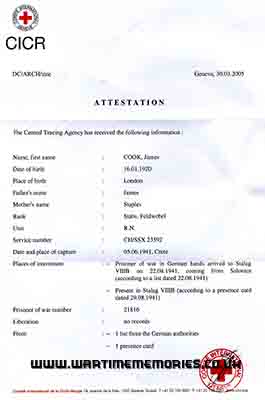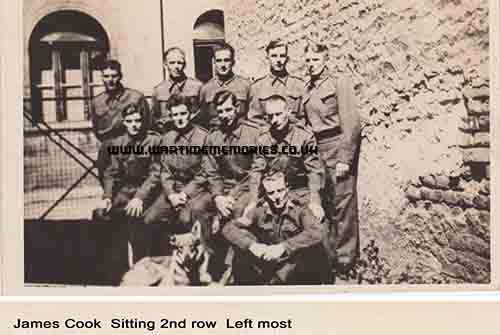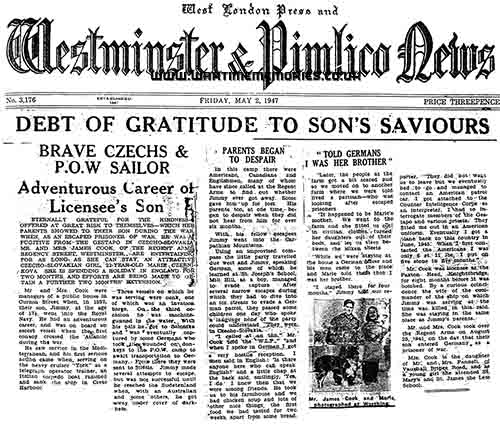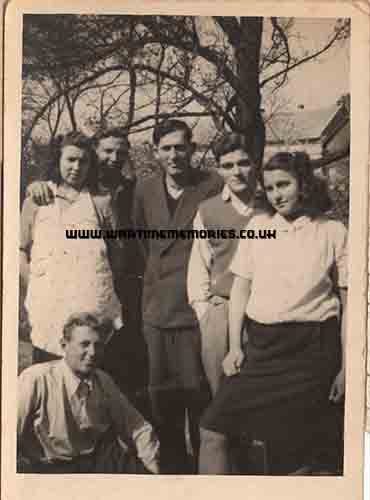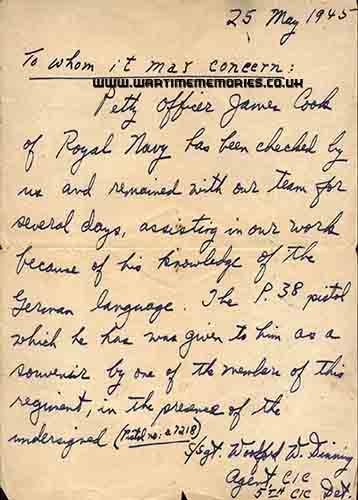Jimmy Cook was born in 1920 in Rotherhithe, London, England, In 1937, at the age of 17, he ran off to sea and joined the Royal Navy. He was trained as a telegraphist and in July 1939 after his training, he was posted as an Ordinary Telegraphist to HMS York, the command ship of the 8th Cruiser Squadron on the America and West Indies Station stationed in Bermuda.
When war was declared, HMS York was in Bermuda and sailed for Halifax, Nova Scotia with Jimmy aboard. The convoys began immediately and the York was an escort for the first convoy to sail from there, HX 1, on Sept 16th.
Over the next two years HMS York participated in a number of different engagements, continuing with convoy duty during the height of the Battle of the Atlantic, the abortive invasion of Norway in April/May of 1940 and the defense of Crete in 1941.
Jimmy had a number of different assignments on the York. Being a telegraphist, he was involved in landing or evacuating troops and other special tasks, in the Norway invasion and in the Mediterranean. During one of these assignments, an invasion barge he was on was sunk and Jimmy and his comrades were machine gunned in the water. After the York was sunk in March 1941, Jimmy remained on Crete until his capture on the 5th of June 1941. We have no details as to how he was captured, only the record from the Red Cross listing him as a prisoner of war. Jimmy was taken to the Transit Camp in Salonika. It was a hard journey on foot with the wounded on donkeys. He later said that he swore he would never walk anywhere again if he could avoid it and as long as I knew him, he kept to his word. The conditions at Salonika were hard and during that time he contracted Sand Fly fever. Eventually, he was shipped by cattle car to Stalag VIIIB in Silesia where Stabs. Feldwebel (Petty Officer) James Cook arrived on August 22nd 1941 as noted by the Red Cross.
Stalag VIII-B, Lamsdorf, located near the small town of Lamsdorf (now called Lambinowice) in what was then known as Upper Silesia near the Czechoslovakian border. Jimmy was kept there for 3 years until his escape in late 1944. We have two pictures that were taken in work camp E-574. Ziegenhals. There were never many comments on life in the prison camp from Jimmy. There was little food and he picked up the habit of eating extremely quickly. The prisoners were given incredibly smelly cheese from time to time and he said many wouldn't or couldn't eat it, but since he had no problem with it, it helped his diet.
My father always said that most of the guards were just regular guys trying to keep their heads down... and he mentioned that mostly that they didn't get any better food than the prisoners. When the prisoners received Red Cross parcels, they traded the goodies with the guards for items that they needed. Jimmy had a great affinity for picking up languages and learned German in the camp. By the end of the war, he would be fluent. Generally, he didn't seem to harbour any ill feeling for the German guards. Although he did mention a guard who stabbed him in the hand with a bayonet for preventing his work detail from doing work that wasn't allowed.
But plans were being made and after a few failures, in late 1944, Jimmy, an Australian and some other men slipped under the wire and escaped their camp. Once they were free and on the move they went into the Carpathian Mountains. Using an improvised compass the little party traveled due west and managed to evade capture. They had several narrow escapes. Once they had to dive into a stream to evade a German patrol. Finally they passed some children one day who spoke a language none of the party could understand. They realized they were in Czechoslovakia. Jimmy related "I called at an inn and when I spoke German I got a very hostile reception. I then said in English...Is there anyone here who can speak English? ... And a little chap at the back said... Yes, I do... I knew then that we were among friends. He took us to his farmhouse and we had chicken soup and lots of other things. It was the first food we had tasted for two weeks apart from some bread. Later, the people at the farm got a bit scared and so we moved on to another farm where we were told lived a partisan who was looking after escaped prisoners. We went to the farm and she fitted us out in civilian clothes, turned her daughters out of their beds and let us sleep between real sheets."
The family was named Czernikova and one of the daughters was named Marie, to whom Jimmy became attached. "While we were staying at the house a German officer and his men came to the place and Marie told them that I was her brother." Jimmy stayed with them for four months. Eventually, even though they did not want them to leave, the little party had to go. They continued on their journey and eventually arrived at the American lines and contacted an American patrol car. After his initial interrogation by the Americans and because of his knowledge of German, Jimmy was asked to help the 5th Counter Intelligence Corps as an interpreter. Always willing to do his bit, he helped interrogate members of the Gestapo and others. The Americans fitted Jimmy out in an American Army Air Forces uniform and gave him a pistol as a souvenir, see the letter telling whom it may concern about this souvenir. The author of the letter, Woodford W Dinning, became a lawyer in Demopolis, Alabama until his death in 1998. Eventually, the Americans arranged for a plane and Jimmy returned to England in June 1945. When Jimmy first contacted the Americans he was only 95 lbs but after five months he put on an additional 70lbs. At this point his time with the military came to an end. He was released from service in November.


